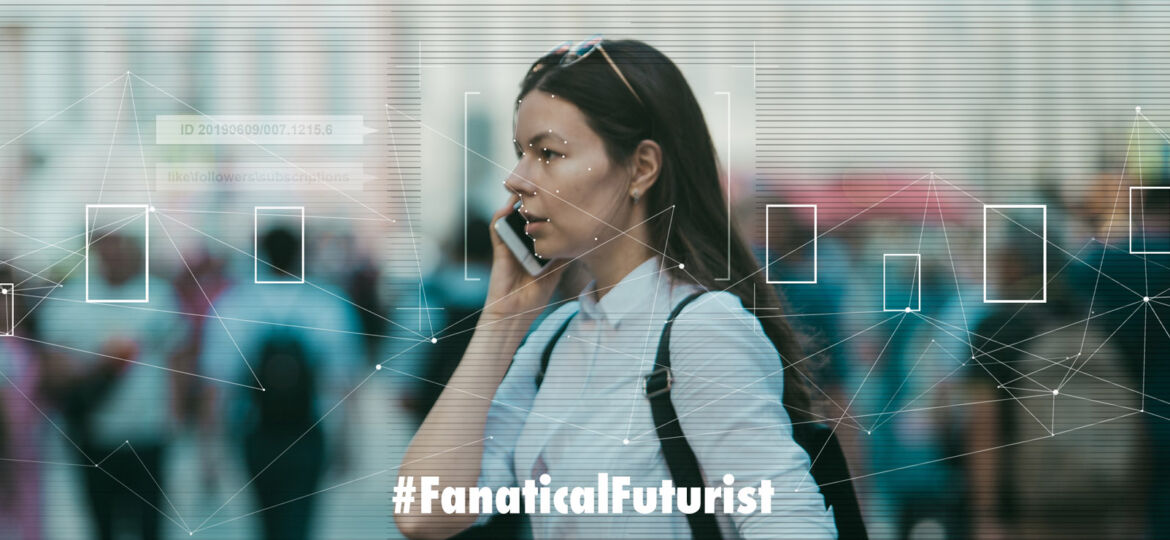
WHY THIS MATTERS IN BRIEF
Imagine no longer being anonymous in public – that reality is already here.
 Interested in the Exponential Future? Connect, download a free E-Book, watch a keynote, or browse my blog.
Interested in the Exponential Future? Connect, download a free E-Book, watch a keynote, or browse my blog.
Biometric identification is great, unless of course you value your privacy. And today we’re mostly used to facial recognition systems, for example, being used by companies online to identify us and governments to, well, identify us again, track us, monitor our behaviours, and ban us from high speed trains and government services if we’re bad – as they now do in China. And while there are ways we can anonymise ourselves online and offline have you ever wondered what would happen if this technology made it into the wild into a civilian app – especially one that knows everything about you including your home address?
Well, for one, I could scan a crowd with it and pick out high value targets to steal off of. If I wanted to of course. Or I could pull up information on you and con you into believing I’m an old work buddy. And then con you again into doing me some favours. Perhaps. And a million other things besides.
Well, now unsurprisingly that powerful technology is slowly creeping out of the hands of those who would seek to control it and it’s starting to get out into the wild so the above scenarios and the weaponization of the technology will just be a matter of time – like the time when a developer created a facial recognition app in Europe to identify online porn stars in the flesh. Which he could then have used to blackmail them with. Perhaps. Needless to say that one quickly got banned and shuttered but you can already see that all this is only going one way.
At the moment facial recognition technology is sort of under lock and key, but as the New York Times reported recently police departments have increasingly been turning to a small company called Clearview whose app can use an existing photo of a person to search for other photos of them online, along with links to where those photos are hosted. The company says the app accesses a database of more than three billion images, collected from social media sites like Facebook and YouTube. Smile.
So far the app has been “provided to hundreds of law enforcement agencies, ranging from local cops in Florida to the FBI and the Department of Homeland Security,” according to the NYT, and could be in use across the US and beyond. Law enforcement officers have confirmed they have used the app to investigate a range of crimes, from the serious to the petty.
Facial recognition technology is already changing life as we know it, being used for security checks at airports, for police investigations, and for monitoring large events like concerts. However, existing technology generally images faces and matches them to a set database, such as a list of persons wanted by law enforcement. The Clearview technology, on the other hand, essentially allows the identification of anyone it images who has a presence online and also provides a list of links to sites to learn more about that person. So just wait for it to get out into the wild.
This is concerning not only because of the potentially disastrous privacy implications but also because of the power it gives to one private company (yet again). Law enforcement agencies admitted to the NYT that they didn’t fully understand how the software worked, and also that Clearview appears to have the ability to monitor who law enforcement is running searches on.
Recently, people have been questioning whether tech companies have too much power and whether they should be providing privacy-invading technology to law enforcement.
Amazon, for example, has been roundly criticized for its providing of facial recognition software to law enforcement, with civil rights organizations like the American Civil Liberties Union saying that the technology is “primed for abuse in the hands of governments” and that it “poses a grave threat to communities, including people of color and immigrants, and to the trust and respect Amazon has worked to build.”
However, on the other hand, while this might all sound dark at least no one will be strangers any longer, and with the arrival of universal translators soon you might be able to scan someone’s face at the airport, learn all about them, and strike up a conversation with them in their own language. Friends forever?
















